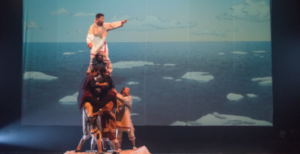If Mozart lived in Yaletown he might have written an opera about a 30-something year old yuppie on a quest to rescue a damsel in distress from the clutches of the evil bartender at the Brickhouse, who once you got to know him, isn’t such a bad guy after all.
Not living in a perfect universe, our friends down at the Vancouver Opera opted for the next best thing, and peopled one of Mozart’s most popular operas with characters and landscapes from the pre-contact Pacific Northwest, then parachuted our man from the Roundhouse right in the thick of it.
The Magic Flute’s characters are so fantastical and its location so nebulous you could get away with almost any setting, so our backyard in an epoch when the trees were as tall as buildings seems a natural choice as any.
This year’s Magic Flute, which opened last Saturday night, is actually a remounting of a well-received 2007 production by Vancouver Opera; which re-imagines the libretto’s shadowy distant land in a First Nations context. Under Robert McQueen’s direction, the production tries to squeeze out a tension between a fast-paced modernity (hence the hero staggering on stage in jeans and sport jacket) and the venerable past, a tension that just isn’t sustained by the libretto, to say nothing of the awkward projections it gives occasion to during the overture.
However, this retooling does allow for some pretty arresting stage craft and costume design, the standout effects being the blue and purple lighting used to represent the west coast dusk, and the staggering moth costume which allows soprano Teiya Kasahara’s Queen of the Night to occupy the stage, physically and vocally, whenever she makes one of her dramatic entrances.
The First Nation’s tribal wear that Chief Sarastro’s retinue walks around in is a little more fetishized, feeling more like the type of ponchos and straw hats you’d shop for at a Gastown gift shop than authentic period pieces.
But who am I to complain? This version has apparently received the blessing of 18 First Nations advisors.
In case you’re a sucker for the good old times, though, I should mention that this Magic Flute has been translated into English, ostensibly to remove any barriers barring full audience immersion in the dreamscape that this production at times achieves.
Unfortunately, this effect becomes totally moot every time the singularly unheroic hero of the opera struts on stage in his Levis and Vans sneakers. The same can be said of his love interest that, despite being a native inhabitant of this long-ago world, inexplicably comes and goes throughout the show in high-heels and jeans.
As for the language, after the first few jarring bars of Mozart in English, you get more or less used to the switch. That is except for the odd occasion when a warmer, sustained back vowel in the original German loses its place to a high “eee” sound which the music just wasn’t written for.
That being said, the vocal performances for the most part were stellar. Baritone Joshua Hopkins never failed to steal the scene whenever his clucking, blue-jay feathered Papageno hit the stage. His singing had just the right balance of dexterity and humour that passages like his “a girl or a woman” aria demand, and he was completely endearing in the spoken parts as well.
Phillip Ens inhabited the role of the staid and dignified Sarastro, and his guttural bass reverberated throughout the hall. Kasahara’s rather more tempestuous Queen of the Night complemented Ens’ character well, and her performance-capping aria was well-executed if didn’t exactly blow the roof off the Queen Elizabeth.
Unfortunately, John Tessier was a little breathless throughout his performance of the hero Tamino, and, with his uncertain stage mannerisms and ill-suited costume, he seemed a little out of place during the whole show.
Although suffering from the same sartorial dilemmas as her male counterpart, Simone Osborne took the character of Pamina, Tamino’s love interest, and made her soar. The highlight of the night for me was not the famous Queen of the Night aria as I thought it would be, but Pamina’s lovelorn dirge which Osborne lets glide through the hall when she believes Tamino’s feelings for her have abated.
Osborne’s voice trembles as her voice hovers over the syllables and colours the text with a sense of extended yearning.
German or English aside, it was Osborne’s performance on Saturday night that brought Mozart to life in Vancouver, not the back projections of waters off what looked like English Bay or corny shots of the new Woodwards building during the overture.
Now if only they’d give the bartender at the Brickhouse his cameo, I’d be a happy man.
The Magic Flute is now playing at Vancouver’s Queen Elizabeth Theatre until March 17th.
Click here for ticket information.









